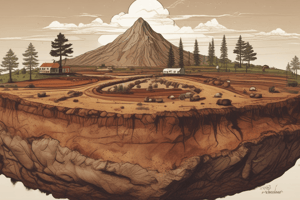Podcast
Questions and Answers
What chemical process primarily affects the distribution of matter in the soil environment?
What chemical process primarily affects the distribution of matter in the soil environment?
- Evaporation
- Biodegradation
- Chemical reactions between soil components (correct)
- Chemical weathering
Which statement about speciation in soil chemistry is accurate?
Which statement about speciation in soil chemistry is accurate?
- Speciation is only concerned with solid soil phases.
- Speciation relates solely to the microbial impact on soil elements.
- Speciation includes common oxidation states and species of elements in soil solution. (correct)
- Speciation does not take into account the physical state of elements.
What is emphasized regarding units and conversions in the environmental soil chemistry course?
What is emphasized regarding units and conversions in the environmental soil chemistry course?
- They are reviewed through problem sets to aid student understanding. (correct)
- They are primarily taught through lectures without practical application.
- They are only discussed in relation to soil minerals.
- They are considered unnecessary due to student background.
What concept related to soil chemical properties is introduced in Chapter 1?
What concept related to soil chemical properties is introduced in Chapter 1?
What is the focus of Chapter 2 in the soil chemistry course?
What is the focus of Chapter 2 in the soil chemistry course?
Flashcards are hidden until you start studying
Study Notes
Soil Phases and Chemical Processes
- Soils have the ability to bind chemical elements, preventing them from being leached into groundwater or transported laterally through subsoil, which would lead to pollution problems.
- Before the mid-1800s, soil was considered a passive support medium for plants, but J.T. Way's studies in the 1850s demonstrated the reactivity of the soil solid phase.
- Chemical substances in soils can be retarded by the solid phase, and their mobility is dictated by processes that distribute them between the immobile soil solids and mobile soil water and gaseous phases.
Soil Phases
- The soil environment consists of three phases: soil atmosphere (gaseous phase), soil solution (aqueous phase), and soil solids (solid phase).
- The soil solid phase is a composite of several phases, including:
- Mineral (inorganic compounds)
- Humus (soil organic matter)
- Biotic (living organisms)
- Boundary phases exist between soil minerals or organic matter and the soil solution, and include:
- Soil exchanger phase (exchangeable ions)
- Adsorbed phase (ions and molecules retained by processes other than exchange or precipitation)
Soil Environment Boundaries
- The soil environment is bounded by the soil surface and soil parent material, with arbitrary lateral boundaries that can be imposed.
- Soils are open systems, allowing energy and matter to enter and exit at these boundaries.
Studying That Suits You
Use AI to generate personalized quizzes and flashcards to suit your learning preferences.




